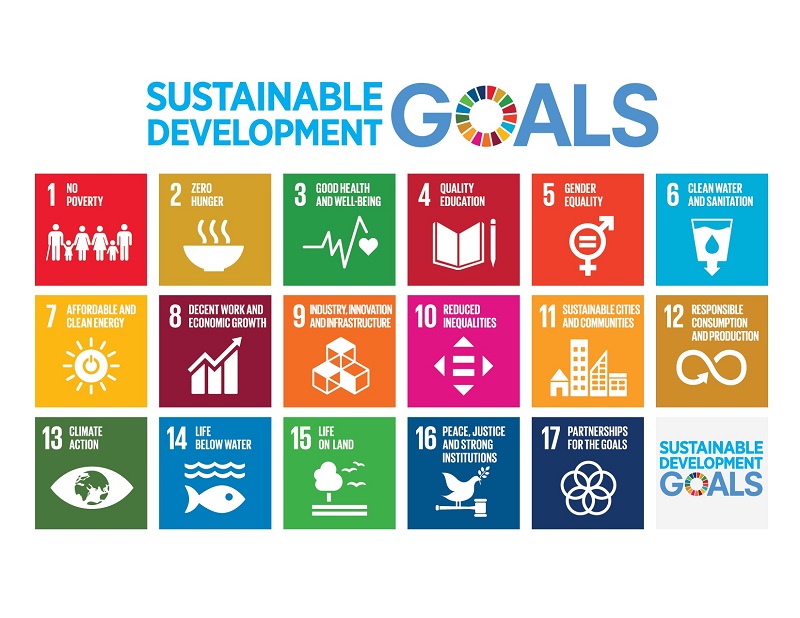UN Sustainable Development Goals

|
Contents |
[edit] Introduction
In 2015, all member states of the United Nations (UN) adopted the 2030 Agenda for Sustainable Development. This was a shared blueprint aiming to achieve peace and prosperity for the entire planet by 2030.
At the heart of the Agenda lie 17 Sustainable Development Goals (SDGs) designed to unite all countries as part of an urgent call for action. The initiative is formulated to be an all-encompassing drive to end global poverty and other deprivations as part of a strategy that also encompasses improvements in health and education, reductions in inequality, economic growth, strategies to tackle climate change and preservation of the world’s oceans and forests.
[edit] The 17 Sustainable Development Goals
- End poverty in all its forms everywhere.
- End hunger, achieve food security and improved nutrition and promote sustainable agriculture.
- Ensure healthy lives and promote well-being for all at all ages.
- Ensure inclusive and equitable quality education and promote lifelong learning opportunities for all.
- Achieve gender equality and empower all women and girls.
- Ensure availability and sustainable management of water and sanitation for all.
- Ensure access to affordable, reliable, sustainable and modern energy for all.
- Promote sustained, inclusive and sustainable economic growth, full and productive employment and decent work for all.
- Build resilient infrastructure, promote inclusive and sustainable industrialisation and foster innovation.
- Reduce inequality within and among countries.
- Make cities and human settlements inclusive, safe, resilient and sustainable.
- Ensure sustainable consumption and production patterns.
- Take urgent action to combat climate change and its impacts.
- Conserve and sustainably use the oceans, seas and marine resources for sustainable development.
- Protect, restore and promote sustainable use of terrestrial ecosystems, sustainably manage forests, combat desertification, and halt and reverse land degradation and halt biodiversity loss.
- Promote peaceful and inclusive societies for sustainable development, provide access to justice for all and build effective, accountable and inclusive institutions at all levels.
- Strengthen the means of implementation and revitalize the global partnership for sustainable development.
Each SDG has one or more targets (total 169) and each target has between one and three indicators. Compliance will be measured according to 232 approved indicators.
[edit] Foundations for the UN Sustainable Development Goals
The SDGs are founded on previous work carried out by various countries and the UN:
- The 1992 Earth Summit in Rio de Janeiro and its adoption of Agenda 21.
- Adoption of the Millennium Declaration at the Millennium Summit in September 2000.
- The Johannesburg Declaration in 2002.
- The Future We Want, UN Conference on Sustainable Development (Rio+20) June 2012.
- UN General Assembly Open Working Group, 2013.
- UN adoption of 2030 Agenda for Sustainable Development including 17 SDGs, 2015.
[edit] Achieving the goals
Implementation of the SDG’s has been on-going since 2016 with governments, institutions, universities and individuals working on at least one, sometimes several SDGs simultaneously.
Further information and updates on the progress of each of these goals can be seen on the UN’s sustainable development website at https://sustainabledevelopment.un.org/.
[edit] Related articles on Designing Buildings
- An interpretation of the SDG's for use at an infrastructure project level.
- Circular economy.
- Clean development mechanism.
- Climate change science.
- Earth overshoot day.
- Energy Related Products Regulations.
- Energy targets.
- Global compact.
- Helping achieve the UN's Sustainable Development Goals.
- Interactive CEEQUAL and Sustainable Development Goals mapping.
- Intergovernmental Panel on Climate Change.
- Millennium Development Goals.
- QSAND and the Sustainable Development Goals.
- Sustainable Development Goals and civil engineering.
- Sustainable Development Goals and the triple bottom line.
.
Featured articles and news
Creativity, conservation and craft at Barley Studio. Book review.
The challenge as PFI agreements come to an end
How construction deals with inherit assets built under long-term contracts.
Skills plan for engineering and building services
Comprehensive industry report highlights persistent skills challenges across the sector.
Choosing the right design team for a D&B Contract
An architect explains the nature and needs of working within this common procurement route.
Statement from the Interim Chief Construction Advisor
Thouria Istephan; Architect and inquiry panel member outlines ongoing work, priorities and next steps.
The 2025 draft NPPF in brief with indicative responses
Local verses National and suitable verses sustainable: Consultation open for just over one week.
Increased vigilance on VAT Domestic Reverse Charge
HMRC bearing down with increasing force on construction consultant says.
Call for greater recognition of professional standards
Chartered bodies representing more than 1.5 million individuals have written to the UK Government.
Cutting carbon, cost and risk in estate management
Lessons from Cardiff Met’s “Halve the Half” initiative.
Inspiring the next generation to fulfil an electrified future
Technical Manager at ECA on the importance of engagement between industry and education.
Repairing historic stone and slate roofs
The need for a code of practice and technical advice note.
Environmental compliance; a checklist for 2026
Legislative changes, policy shifts, phased rollouts, and compliance updates to be aware of.

















